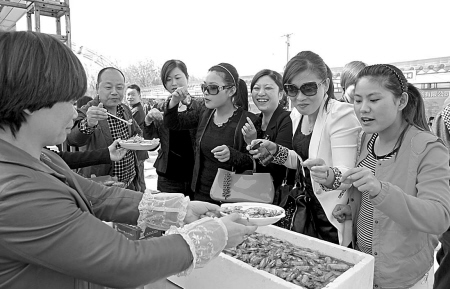- Details
-
Category: Ningbo District
-
Published: Friday, 19 April 2013 08:22
While container throughput slacks off in the Pearl River Delta ports, shippers in east China’s Zhejiang Province are keeping the box tallying people busy.
“One out of five people here owns an import-export company,” the Ningbo forwarder said as we drove through the streets of the city.
It would be difficult to confirm this statistic, but the business-focused attitude of the Zhejiang Province’s people is legendary. For instance, Zhejiang is where porcelain was found, a hallmark of Chinese culture. The arts, education, science and technology flourish in the province, and its capital, Hangzhou, was one of the seven ancient capitals of China.
There is certainly an army of SMEs in the province that drives the port throughput. The city of Yiwu near Hangzhou is famous for its small commodity trade and frenetic free markets, auto parts makers are clustered around Wenzhou and Taizhou, with garment manufacturers around Ningbo.
The province lies on the southern border of Shanghai and while publicly there is official cooperation between the two provinces, Ningbo views its larger northern neighbour as a bitter rival.
Ningbo has a natural deepwater harbour and in the early 2000s, the city was making a strong bid to become China’s maritime centre and container shipping hub. It what was widely seen as a result of political interference by former premier Jiang Zemin, once mayor and later party chief of Shanghai, the shipping hub role was assigned to Shanghai. So instead of making use of the natural deep water of Ningbo, the port of Yangshan was built 32km offshore from Shanghai at enormous expense.
But that is old news now and Ningbo is fast forging its own path, ready to move past Busan into the world’s fifth busiest container port. It is already number three in China behind Shanghai and Shenzhen and in the first quarter of this year the throughput growth has been in the double digits.
There are concerns that the export growth is slowing. While the port figures do not appear to back this up, the Ningbo forwarder explained that several companies he did business with had been forced to close down from a lack of orders.
But even as exports slowed, imports into China are growing. He said his company had secured new import customers and the increasing availability of foreign foodstuffs can be seen at supermarkets in Ningbo that have allocated the products more shelves and counter space.
There is a common assumption that China factories focusing on exports can easily turn around and cater to the domestic market, which is not the case at all. Domestic garments first need to be designed and there are not enough locals with that experience. The clothes are all different styles to those sent overseas, the market wants different colours and the volumes are less than those ordered by big retail stores in the US and Europe.
China’s economy will never abandon its focus on exports even as factories boost production of goods to satisfy growing domestic consumption. And while it waits for export orders ramp up, manufacturers are urgently putting in place the sales channels and distribution networks required to serve the local market.
- Details
-
Category: Ningbo District
-
Published: Tuesday, 16 April 2013 10:16
Benefited from the construction of inland dry port and the operation of the five-set scheduled trains, Sea-Railway Transportation in Ningbo Port increased by a big margin. According to Ningbo Customs data, the sea-rail container throughput of Ningbo port reached 23,248 TEUs in the first quarter of this year, an increase of 74% over the same period last year, ranking the second largest port of sea-railway transportation.
The liner carriages of Ningbo-Taizhou sea-railway transportation were raised form four pairs per week to one pair per day since January of this year. The cargo throughput of Taizhou exported through Ningbo Port increased by three times over the same period last year. At present, Ningbo Port has opened five-set scheduled trains to Taizhou, Jinhua, Shangrao of Jiangxi Province and Xiangyang of Hubei province. Over 30 dual-trip trains were sent weekly. At the same time, the construction of inland dry port was accelerated in Zhejiang Province to build one-stop port services for local foreign trade enterprises.










